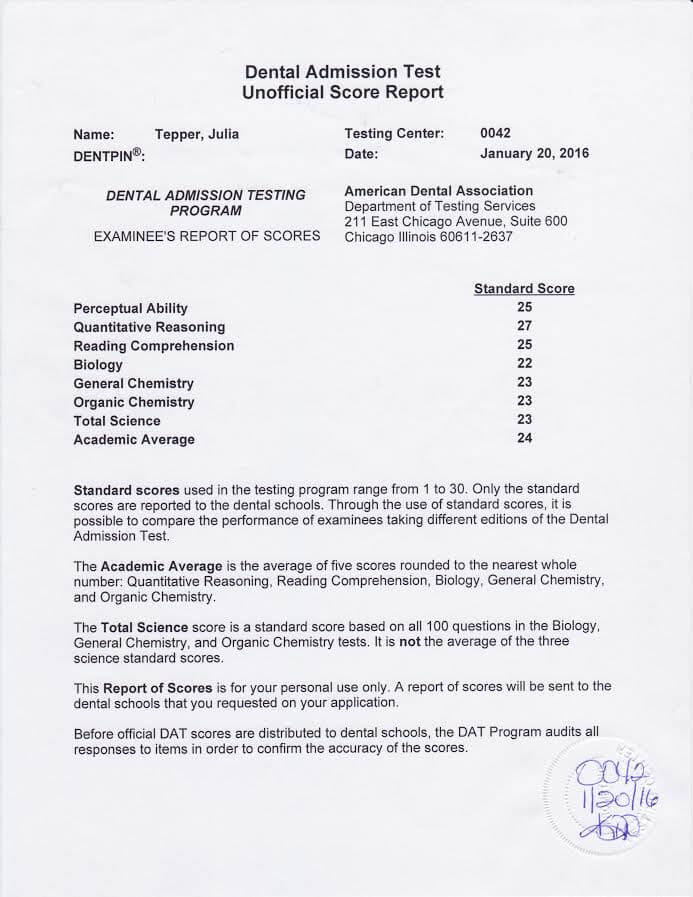Featured Student of May

Meet Julia Tepper, a happy DAT Bootcamp customer who recently conquered the DAT. I’ve asked Julia to share her DAT experience with us as the featured student of May.
What is one piece of advice you would give to another student preparing to take the DAT?
“The journey of a thousand miles begins with a single step.” – Lao Tzu
Starting is always the hardest part. It is easy to be overwhelmed by the immense volume of material that is covered on this one exam, and not knowing where to begin was keeping me from actually starting. My advice is to just start anywhere. Choose anything, it doesn’t matter what subject. Once you’ve jumped in, the rest will start falling into place. Initially, I was trying to plan out the “perfect” study strategy. I spent a lot of time comparing my study tactics with those of other students, but this gradually ate away at my confidence and left me feeling worse.
Here’s a hint: studying for the DAT is not one-size-fits-all. What works for someone else may not work for you, and that is okay. Everyone can tell you to do something in a different way. Listen to yourself and once you figure out what suits you best, stick with it! Also, try not to be discouraged when you don’t see immediate improvements in your practice test scores. The key is realizing that it’s exactly like building up any muscle in the body; it doesn’t happen overnight. Just like an Olympic athlete trains for a competition, studying for the DAT requires countless sessions of hard work, consistency, sustained attention, and a lot of discipline. And most importantly, believing in yourself.
How did you use DAT Bootcamp to prepare for the DAT?
While all of the practice tests on DAT Bootcamp are great, I found that the detailed breakdowns provided for each answer choice were even more valuable to me. After completing a test, I made flash cards of every single explanation given on the answer key (equally important for both correct and incorrect answer choices) and always carried some cards with me. No better place to learn about gel electrophoresis than a long checkout line or the waiting room of a doctor’s office.
A few weeks before the test, I set DAT Bootcamp as my internet homepage. I forced myself to spend time using the PAT generators prior to checking email or going to any other websites. It seemed to me that perceptual skills have a very fast rate of decay. If I went even one day without ranking angles or pattern folding, I struggled so much more the next time. Consistently practicing with the generators every single day, multiple times per day, made a tremendous difference in my perceptual ability and really paid off.
What would you do differently to prepare for the DAT?
Quality time > quantity time.
It took me a while to realize this. Early on, I would force myself to continue studying even when I was no longer absorbing the material. I felt that it was a sign of weakness to “give in” and close the books. Eventually, I realized how counterproductive this mindset was and I stopped pushing myself to study once I was past my saturation point. You know when you have reached your limit. If you find yourself rereading the same paragraph or unable to distinguish a dashed line from solid, take a break and go for a walk, meet a friend, or get some sleep. You will come back to the studying so much more refreshed and with a much higher level of concentration. Also, ruling out distractions while you’re studying will allow you to accomplish a lot more in a shorter amount of time. Lastly, don’t underestimate the importance of keeping yourself healthy throughout the process and not getting run down before the test date!
What advice do you have for a student studying for the test without taking all of the prerequisites?
Although I was apprehensive about taking the DAT after one semester of organic chemistry, I realized that so much of every subject in school is self-taught and this was no different. Don’t be afraid to take a practice test in a subject you are missing and get a low score! I found it most helpful to work backwards from practice problems once I saw the types of commonly asked questions relating to the new material. This enabled me to see how deep of an understanding was truly expected for a certain topic. You may be surprised that for some of the subject matter, the exam questions will only require general knowledge. For other areas, however, you might need to open a textbook and learn those sections well. Start by familiarizing yourself with the main topics that you’re missing (either by flipping through a textbook or review book) and then narrow your focus based on the style of questions that are most frequently asked. If you specifically gear your learning towards the test questions, you will cut down on the total study time and save yourself from memorizing extraneous information. Teaching yourself the missing material is definitely doable, and it also shows an admirable level of motivation on your behalf.
- Biology22
- General Chemistry23
- Organic Chemistry23
- Reading Comprehension25
- Perceptual Ability25
- Quantitative Reasoning27
- Academic Average24

Get a better DAT score
Get instant access to 60 practice tests, Mike's Chemistry Videos, PAT generators, the full-length test simulator, and a lot more.
Upgrade Your Membership
